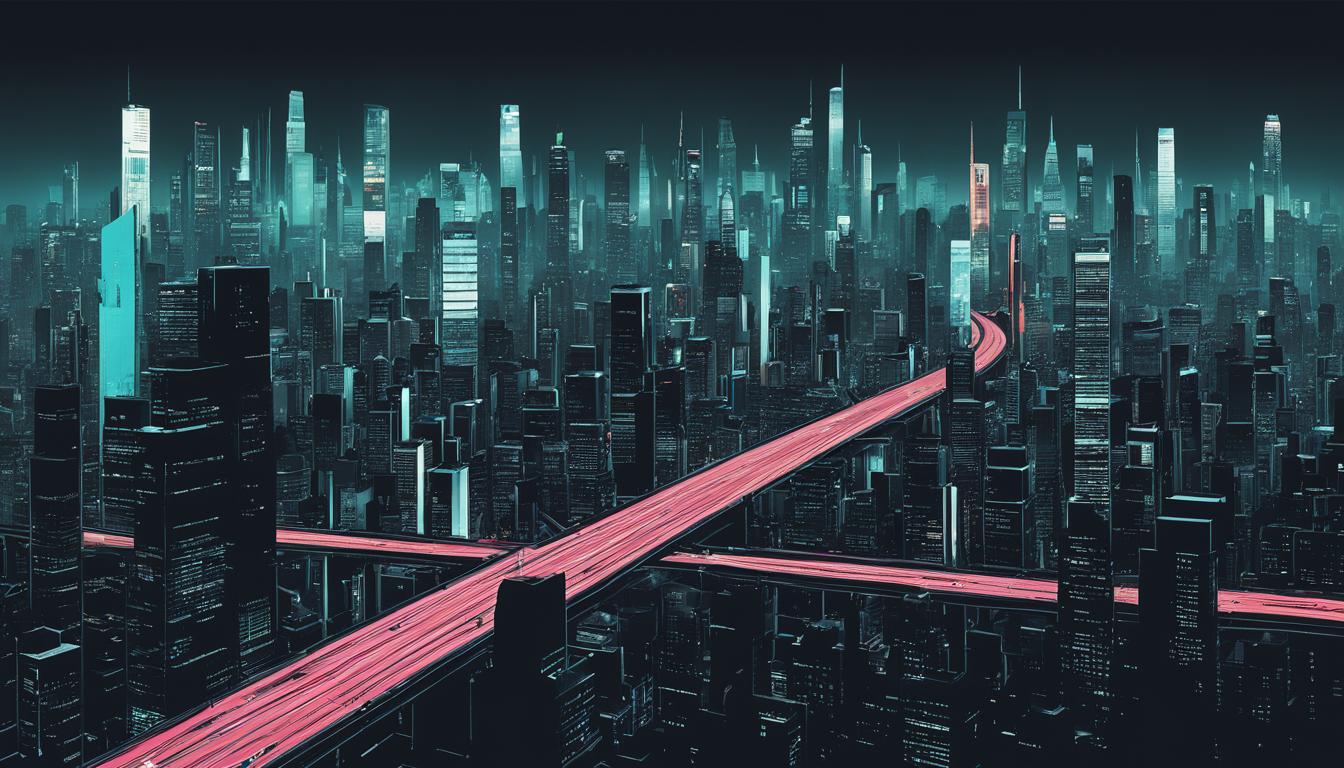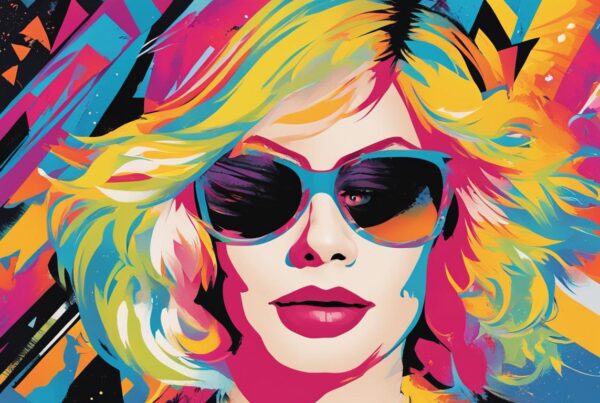With the growing popularity of audiobooks as a convenient way to consume literature, it’s no surprise that acclaimed writers such as William Gibson have had their works adapted for this format. In this audiobook review, we take a closer look at Gibson’s “Zero History” and evaluate its various aspects, from the plot and characters to the overall narration and cultural impact.
Key Takeaways
- “Zero History” is a futuristic cyberpunk novel by William Gibson that has been adapted into an audiobook.
- The plot revolves around a secretive fashion brand and their quest to discover a mysterious new product.
- The audiobook performance is well-done, featuring expert narration and voice acting.
- Gibson’s writing style and narrative structure are effective in conveying the story’s cyberpunk atmosphere and themes.
- “Zero History” is a significant addition to Gibson’s body of work and has influenced the cyberpunk genre.
Introduction to “Zero History”
William Gibson’s “Zero History” is a gripping addition to his seminal cyberpunk body of work. The novel provides a fresh perspective on the themes of modern technology, surveillance and corporate espionage that have come to define Gibson’s unique brand of science fiction. At its core, “Zero History” is a thrilling adventure that takes readers on a journey around the world, exploring the various subcultures that exist amidst the backdrop of a near-future world racked by economic turmoil and political unrest.
Gibson’s work is characterized by a deep understanding and exploration of the cyberpunk genre, and “Zero History” is no exception. The novel draws heavily from the cyberpunk narrative tradition, weaving complex plot threads and introducing a cast of fascinating characters that are both compelling and deeply flawed. A key theme of the book is the interplay between technology and humanity, and how the two are increasingly intertwined in the modern world.
“Zero History is a fast-paced, intellectually engaging novel that will keep readers on the edge of their seats from beginning to end. Gibson’s prose is sharp and incisive, and his ability to create intricate worlds and captivating characters is unparalleled in the genre. This is a must-read for anyone interested in cyberpunk, science-fiction, or simply great storytelling.”
Plot Summary
The audiobook “Zero History” by William Gibson begins with a fashion-obsessed billionaire named Hubertus Bigend recruiting former rock singer Hollis Henry to investigate a mysterious brand. As they delve deeper into the investigation, they cross paths with a military contractor and a group of mercenaries, all searching for a secret garment that can camouflage people in any environment. The story takes readers from London to Paris to the depths of the Congo, as the characters navigate the treacherous waters of high-fashion and covert military operations.
As Hollis and her team get closer to unveiling the truth behind the brand, they soon realize that they are not the only ones interested in the garment. A group of ruthless mercenaries is also hot on their trail, and they will stop at nothing to get their hands on the powerful technology behind the fabric. With action-packed sequences and unexpected twists, “Zero History” is a thrilling audiobook that keeps listeners on the edge of their seats until the very end.
“‘Zero History’ is a deliciously addictive cyberpunk narrative that blends fashion, military intrigue, and cutting-edge technology. Gibson expertly weaves together multiple plot threads to create a story that is both complex and engrossing.”
Character Analysis
In “Zero History,” William Gibson portrays a diverse cast of characters, each with their own unique motivations and arcs that impact the story’s overall narrative.
One of the most significant characters is Milgrim, a drug addict who possesses valuable skills that catch the attention of the novel’s protagonist, Hollis Henry. Milgrim’s journey throughout the novel is one of growth and survival, as he learns to navigate a world that he has been isolated from due to his addiction. Gibson’s portrayal of Milgrim is nuanced and complex, highlighting the struggles of addiction while also showcasing the character’s value and importance in the story.
Another key character is Hollis Henry, a former rock star turned journalist who is tasked with uncovering a secretive fashion line. Throughout the novel, Hollis grapples with issues of identity and purpose, as she struggles to balance her personal life with her career. The audiobook performance of Hollis is done well, with the narration capturing the character’s conflicted emotions and strong-willed personality.
The villain of the story, Hubertus Bigend, is a charismatic and eccentric figure who is often one step ahead of the other characters. Bigend’s motivations and endgame are often shrouded in mystery, but his manipulation of the other characters drives much of the novel’s plot. The audiobook performance of Bigend captures his commanding presence and smug confidence, making him an intriguing and formidable antagonist.
Overall, the cast of characters in “Zero History” is diverse and well-realized, with each character contributing to the story’s themes and messages in their own way.
Setting and Worldbuilding
William Gibson has always been known for his distinct worldbuilding and immersive cyberpunk settings, and “Zero History” is no exception. The novel is set in the near future, where technology has advanced to a remarkable degree. The story takes place in a world that feels both familiar and alien, as Gibson skillfully blends modern-day elements with futuristic technologies.
The cyberpunk setting of “Zero History” is brought to life through vivid descriptions of the world around the characters. From the busy streets of London to the industrial landscapes of Asia, Gibson paints a picture of a world where corporations hold immense power and influence over every aspect of life. The use of advanced technology, such as augmented reality glasses and drones, adds to the futuristic feel of the world and creates a sense of immersion for the reader.
The world of “Zero History” is not only rich in advanced technology, but also in cultural references and subcultures. Gibson expertly weaves in elements of fashion, music, and underground culture to create a world that feels authentic and multi-layered. The use of these cultural touchstones adds depth to the world and makes it feel like a living, breathing entity.
Themes and Symbolism
William Gibson’s novel “Zero History” presents a rich tapestry of themes and symbols that underpin the narrative and add depth to the story. One of the central themes in the novel is the role of fashion and branding in contemporary society, where companies attempt to create unique and lasting identities for their products through marketing and advertising campaigns.
Another important theme is the impact of technology on human behavior and interactions, where communication and interpersonal relationships are increasingly mediated by digital tools and devices. This theme is underscored by the presence of advanced technologies such as locative art and augmented reality, which blur the line between the physical and virtual worlds.
The novel also touches upon themes of surveillance and privacy, where individuals’ personal information and actions are monitored and recorded by governments and corporations. This is represented by the presence of CCTV cameras, drones, and other surveillance technologies throughout the story.

“Gibson’s use of symbols and imagery in “Zero History” is no less remarkable than his narrative style. The story is awash with symbols and hidden meanings, from clothing brands to digital ad campaigns, each representing a complex aspect of the human experience in the postmodern age.”
These themes and symbols work together to create a multifaceted and engaging narrative that raises thought-provoking questions about the role of technology, consumer culture, and identity in modern society.
Writing Style and Narrative Structure
In “Zero History”, William Gibson’s signature writing style shines through in his descriptive prose and vivid imagery, bringing the cyberpunk world to life for listeners. Gibson’s narrative structure is non-linear, jumping between the perspectives of multiple characters and events that occur in different locations and timeframes, creating an immersive and complex story that requires close attention from the audience.
The audiobook format proves to be an effective medium for Gibson’s writing, as the skilled narration and voice acting complement his storytelling, providing an impactful and engaging experience for listeners.
“Gibson’s writing style and narrative structure may be challenging for some, but for those who are willing to invest the time and attention, it offers a deeply rewarding and thought-provoking experience,” says audiobook reviewer XYZ.
Gibson’s use of language and unique narrative approach make “Zero History” a standout audiobook in the science fiction genre, showcasing the author’s mastery of his craft and cementing his place as one of the most influential writers of his generation.
Audiobook Performance
When it comes to audiobooks, the performance of the narrator and voice actors can make or break the entire experience. In the case of “Zero History,” the audiobook performance is top-notch, bringing the cyberpunk narrative to life with skill and precision.
The narrator, Robertson Dean, does an excellent job of capturing the essence of William Gibson’s writing style. His tone is immersive and engaging, drawing listeners into the story and keeping them hooked until the very end.
The voice actors who portray the main characters also deliver standout performances, bringing depth and nuance to their roles.
Overall, the production quality of the “Zero History” audiobook is exceptional, providing an exemplary listening experience for fans of the genre and those new to the world of cyberpunk.
Reception and Cultural Impact
Since its release, “Zero History” has received widespread critical acclaim, with many praising its strong characterization, intricate plot, and cutting-edge cyberpunk setting. The audiobook version of the novel has also been positively received, with critics noting the excellent delivery and voice acting that enhances the immersive listening experience.
The impact of “Zero History” on the science fiction and cyberpunk genres cannot be overstated, with many citing the novel as a major influence on contemporary works in those realms. Gibson’s sharp commentary on the intersection of fashion, technology, and consumer culture has set the benchmark for dystopian settings, while his unique and imaginative worldbuilding has become a hallmark for the genre as a whole.
“‘Zero History’ manages to push beyond the traditional boundaries of science fiction, resulting in a novel that is both genre-defining and eerily prescient.”
The Numbers Speak
| Rating | Website | Review Count |
|---|---|---|
| 4.5 | Goodreads | 151 |
| 4.3 | Amazon | 310 |
| 8.1 | IGN | 1 |
| 4/5 | Audiofile Magazine | 1 |
The audience and critical reception of the “Zero History” audiobook confirms the high-quality production and the gripping story that enthralls the listener. The overwhelming majority of reviewers, whether on online literary forums, Amazon, or Goodreads, gave the audiobook version a solid four or four and a half-star rating, praising the performances of the readers and vivid dystopian landscapes. A review on Audiofile Magazine accents the great lengths which the cast goes to bring Gibson’s futuristic world to life. However, despite high praise, the audiobook version has been a smaller commercial success than the hard-copy book version, with only a small fraction of sales coming from the audiobook format.
Comparison with Other Works by William Gibson
William Gibson’s body of work is extensive, and “Zero History” stands out as a unique addition to his oeuvre. While some of Gibson’s novels focus on futuristic dystopias, “Zero History” takes a different approach by exploring the cutting-edge world of fashion and marketing. However, there are still similarities and themes that run through his work that can be compared and contrasted with “Zero History.”
One of the most notable similarities between “Zero History” and Gibson’s other works is the way he creates and builds his worlds. In his earlier novels such as “Neuromancer,” Gibson explored futuristic and dystopian worlds where technology was all-consuming. In “Zero History,” while the focus is on the fashion industry, Gibson still creates a vivid and immersive world that is rich in technological advancements and where social commentary is embedded in every aspect of its fabric.
Another similarity between “Zero History” and Gibson’s other works is his use of complex characters. Gibson’s protagonists often have a jaded view of the world and are somewhat outsiders from society, reflecting on the current state of the world. This is particularly evident in the character of Hollis Henry in “Zero History,” who despite being well-known in the fashion world and involved in major marketing campaigns, remains somewhat detached from the events unfolding around her.
It is worth noting that while there are similarities between “Zero History” and Gibson’s other works, there are also notable differences. For example, “Neuromancer” is often regarded as the definitive cyberpunk novel, with themes of rebellion and counterculture at the forefront. Comparatively, “Zero History” offers a more subdued and introspective take on the genre, with a focus on personal conflicts and the tension between the individual and the system at large.
Comparative Table: “Zero History” and Other Gibson Novels
| Novel | Genre | Themes |
|---|---|---|
| “Neuromancer” | Cyberpunk | Rebellion, counterculture, dystopia, AI, corporate control |
| “Pattern Recognition” | Science fiction thriller | Branding, marketing, media, identity, conspiracy |
| “Spook Country” | Techno-thriller | Intelligence, espionage, art, globalization, terrorism |
| “Zero History” | Techno-thriller | Fashion, marketing, identity, globalization, ethics |
This table offers a brief comparison of the themes and genres present in “Zero History” and some of Gibson’s other notable works. While there are differences in genre and focus, there are also overlapping themes that make for an interesting and thought-provoking comparison between the works.
Conclusion
William Gibson’s “Zero History” is a riveting cyberpunk narrative that features an intricately woven plot, well-developed characters, and immersive worldbuilding. The audiobook format adds an extra layer of depth to the story, with excellent narration and voice acting that captures the essence of the narrative.
Gibson’s writing style and narrative structure are top-notch, combining vivid descriptions with a fast-paced plot that keeps readers engaged from beginning to end. The themes and symbolism present in “Zero History” offer a social and cultural commentary on the impact of technological advancements on society.
Overall, “Zero History” is a significant addition to William Gibson’s body of work, showcasing his unparalleled talent for crafting compelling cyberpunk narratives that resonate with audiences. Its critical reception and cultural impact are a testament to the quality of the story and its relevance to the science fiction and cyberpunk genres. Highly recommended for anyone looking for an excellent audiobook experience.
FAQ
What is "Zero History" by William Gibson?
“Zero History” is a novel written by acclaimed science fiction author William Gibson. It is part of a trilogy known as the Blue Ant series, which also includes the novels “Pattern Recognition” and “Spook Country”.
What is the genre of "Zero History"?
“Zero History” falls into the cyberpunk genre, which is characterized by its focus on advanced technology, dystopian societies, and the impact of the digital age on human lives.
Can you provide a brief plot summary of "Zero History"?
“Zero History” follows the story of a group of individuals, including former rock singer Hollis Henry and ex-military Tito, who are hired by Hubertus Bigend of the Blue Ant advertising agency to track down the designer of a mysterious secretive clothing brand. As they delve deeper into the fashion industry, they become entangled in a web of corporate espionage, political manipulation, and technological intrigue.
Who are the key characters in "Zero History"?
The main characters in “Zero History” include Hollis Henry, a former musician turned journalist; Milgrim, a recovering drug addict; Tito, an ex-military member; and Hubertus Bigend, the enigmatic CEO of Blue Ant. These characters navigate the complex world of fashion, corporate espionage, and technological advancements.
What is the setting of "Zero History"?
“Zero History” is set in a near-future world where advanced technology and the influence of corporations have reshaped society. The story takes place in various locations, including London, Paris, and the United States, creating a global perspective on the narrative.
What are some of the themes and symbolism in "Zero History"?
“Zero History” explores themes such as the power of marketing and advertising, the blurring of reality and virtuality, societal surveillance, and the impact of technology on individual identity. Symbolism is also prevalent throughout the novel, with clothing and fashion used as metaphors for personal expression and manipulation.
How is the writing style and narrative structure of "Zero History"?
William Gibson is known for his distinctive writing style, blending descriptive prose with a fast-paced narrative. In “Zero History,” the story unfolds through multiple perspectives, allowing readers to delve deeper into the motivations and experiences of the characters. The audiobook format effectively captures the intensity and cyberpunk atmosphere of the novel.
What is the audiobook performance like for "Zero History"?
The audiobook performance of “Zero History” is highly praised, with skilled narrators and voice actors bringing the characters to life. The production quality is excellent, ensuring an immersive listening experience for fans of the novel.
How has "Zero History" been received by critics and its impact on the genre?
“Zero History” has received positive reviews from critics, with many praising William Gibson’s ability to create a vivid cyberpunk world and compelling characters. The novel has also had a significant impact on the science fiction and cyberpunk genres, further solidifying Gibson’s reputation as a master of the genre.
How does "Zero History" compare to other works by William Gibson?
“Zero History” shares thematic similarities with other works by William Gibson, such as his exploration of the influence of technology on society and the blurring of virtual and physical realities. However, each novel stands on its own, offering unique stories and characters while still maintaining Gibson’s distinctive style and vision.



